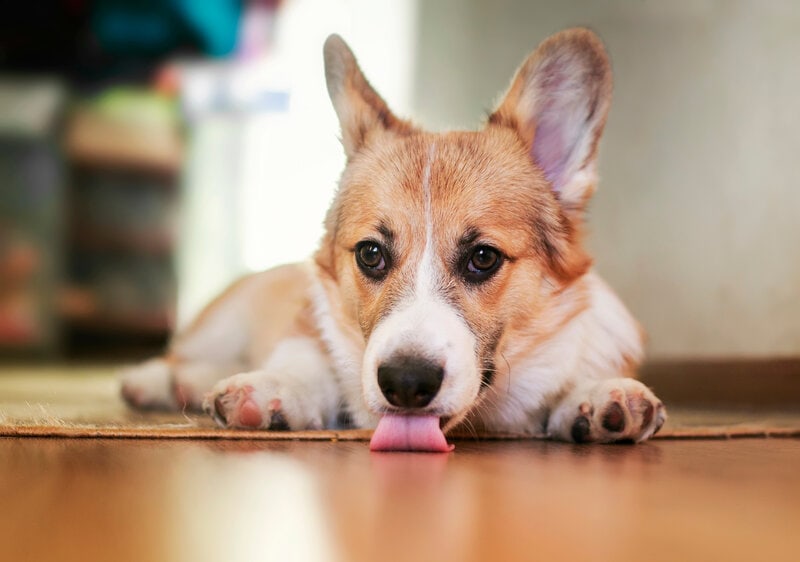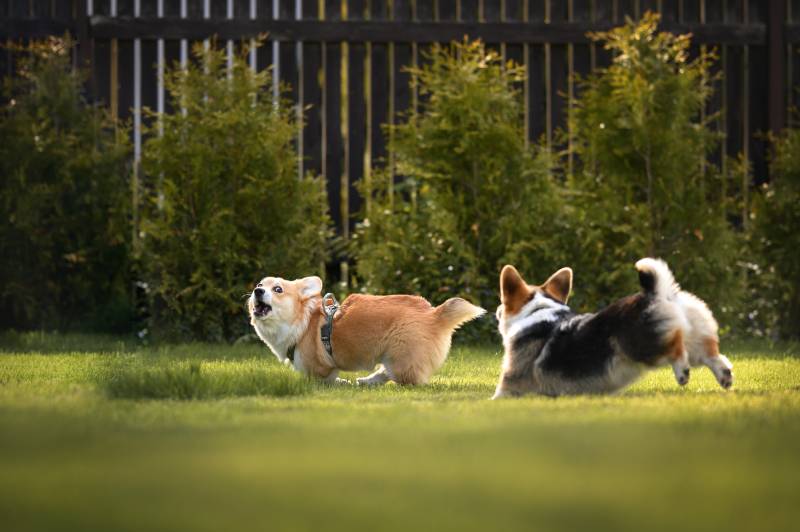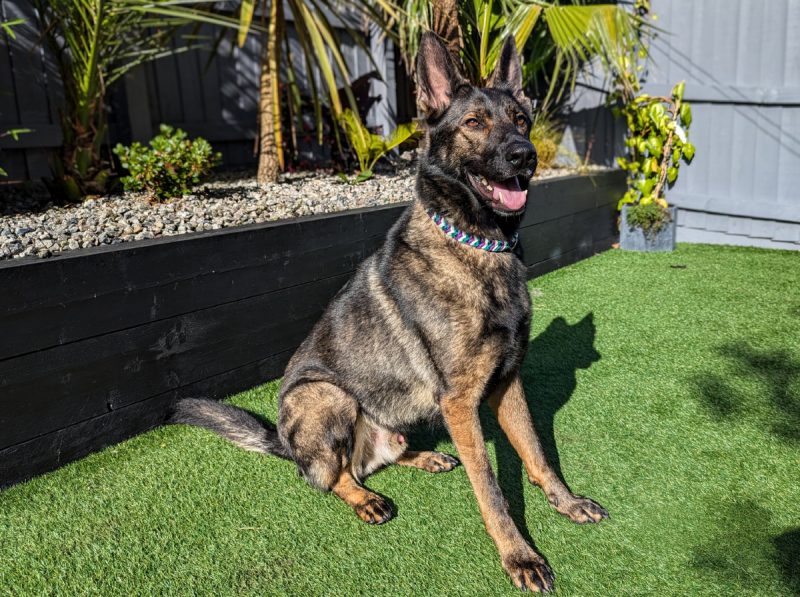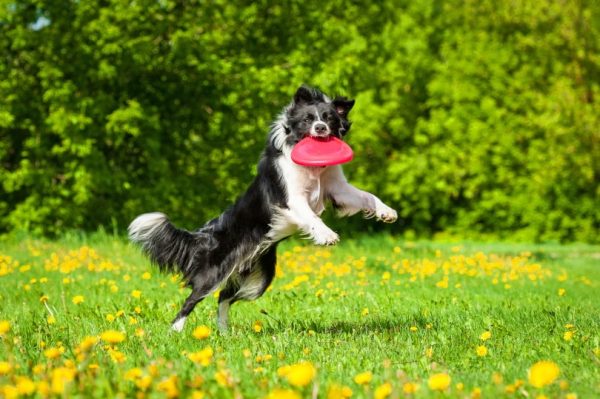In this article
Pembroke Welsh Corgis are small to medium-sized dogs with outsized personalities. They’re energetic, enthusiastic, and eager to please their human companions. They don’t grow much larger than about 12 inches at the shoulders, and most weigh under 30 pounds. They have broad chests and short legs, and most are extraordinarily agile.
The breed’s ancestors herded sheep and cattle. Modern Corgis are also classified by the American Kennel Club (AKC) as a herding breed. They’re related to Cardigan Welsh Corgis, who are larger and typically have rounded ears and longer tails than their Pembroke cousins. Pembroke Welsh Corgis were the 11th most popular breed in the US in 2023. Corgis are generally considered relatively low-maintenance pets.

Can You Leave Corgis Alone?
It’s usually fine for healthy adult dogs to stay by themselves for around 4 hours or so regularly. Consider hiring a dog walker or taking your pet to doggy daycare if you’re regularly out of the house for longer periods.
Dogs that are particularly attached to their owners sometimes develop separation anxiety, a condition in which pets experience high levels of anxiety and stress when left by themselves. Corgis are extremely social, and most enjoy running and playing in the company of their favorite people, so they can easily become lonely, bored, or anxious when left alone for too long.
Barking, pacing, and pooping inside are common signs of separation anxiety in dogs. Other signs include escape attempts and whining. Dogs with mild separation anxiety often benefit from increased exercise, particularly before being left alone. Enrichment activities, such as food puzzles, can keep dogs from becoming bored when left to fend for themselves.

Are Corgis Good With Children?
Corgis are fantastic with children. These energetic dogs love to jump and play, making them great childhood companions. They’re also loving, smart, and protective. Without solid training, Corgis often nip and herd children. They’re capable of knocking over smaller kids when those famous Corgi herding instincts kick in, and it’s vital to supervise interactions with small children.
Good early training can make a huge difference with these energetic dogs. Puppies can start learning basic commands when they’re around 8 weeks old. It’s also a great time to concentrate on socialization by exposing puppies to novel experiences, animals, and people.
Do Corgis Get Along Well With Other Pets?
Some Corgis have difficulty getting along well with other pets, primarily due to the breed’s herding instincts and high-energy levels. Corgis were bred to be herders, which can sometimes lead them to engage in less-than-desirable behaviors, such as nipping and even attempting to round up small people and animals. Good training often helps keep these behaviors from getting out of hand.
Many Corgis get along quite well with other pets, often enjoying playful interactions at doggy parks. Dogs get along better with other canines when socialized as puppies. Corgis and cats that grow up with each other often spend much of their time together and get along quite well.
When it comes to introducing Corgis and cats, time is your friend. Take things slowly and keep your pets apart initially to allow them to become accustomed to the other’s scent and presence. Ensure your cat has a dog-free safe space they can always escape to increase their sense of security, which often lowers the temperature enough for pets to begin acclimating to each other.

Are Corgis Good Apartment Dogs?
Corgis aren’t big and don’t require large indoor spaces, but they are energetic and may run around a bit too much for the downstairs neighbors. Corgis can also get vocal, which can cause some problems in close living quarters.
While Corgis are often small enough to live in apartments comfortably, they require frequent exercise, so expect to spend at least 1 hour per day or so engaged in physical activities such as walking or playing with your pet. Not only is exercise critical for Corgis’ physical health, but it’s also essential for their mental well-being; happy dogs often exhibit fewer stressed-related behaviors, such as pacing and barking.
Are Corgis Good Choices for First-Time Dog Owners?
Corgis aren’t always the best choice for first-time dog owners since they require solid early training to control the nipping, barking, and herding. Because training is so crucial with Corgis, first-time owners often struggle since they’re learning the basics of human-canine interaction and dog training while attempting to put those skills into practice to convince these energetic animals to stop doing the very activities they were bred to do. But Corgis are also incredibly smart, and they’re capable of learning and often enjoy training, as it gives them the physical activity they crave along with mental stimulation.

What Are Some Low-Maintenance Dog Breeds
Dachshunds, French Bulldogs, Chihuahuas, and Greyhounds typically make great low-maintenance dogs. Greyhounds require far less exercise than you might imagine, as these dogs were bred for speed, not endurance. Most need around 30 minutes of daily exercise. Basset Hounds and Boston Terriers also make excellent choices, as they don’t have high grooming or physical activity needs.

Final Thoughts
Pembroke Welsh Corgis are an incredibly popular breed. They were Queen Elizabeth II’s favorite! Corgis are happy, energetic, and friendly dogs. They make delightful family pets and wonderful childhood companions. Most enjoy other animals’ company and generally get along well with cats and dogs.
Good early training and socialization go a long way toward reducing some of the nipping and herding behavior the breed sometimes displays. Most don’t require much grooming or have unusual dietary requirements, making Corgis reasonably low-maintenance pets for those with the time and energy to provide sufficient mental stimulation and exercise.
See also:
- 11 Essential Corgi Supplies to Get You Started: Vet-Reviewed Guide
- Why Does My Corgi Sleep on Their Back? 3 Likely Reasons
Featured Photo Credit: lucioliu, Pixabay



















